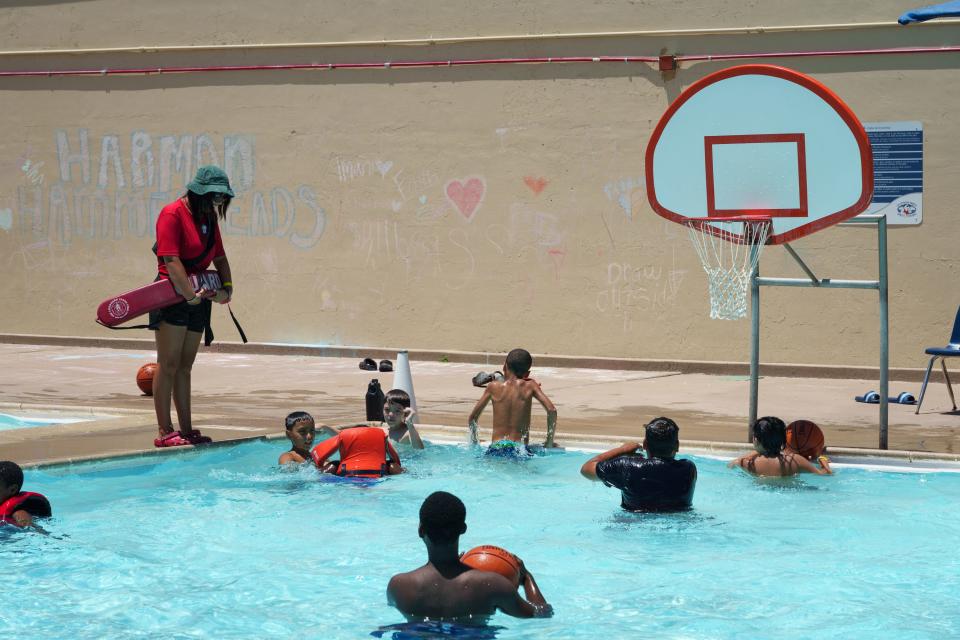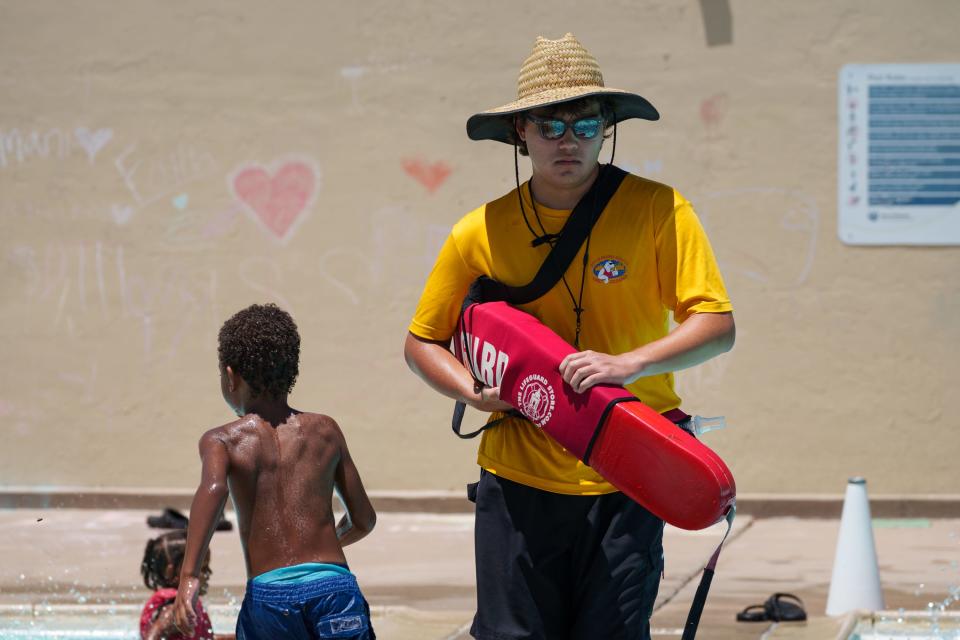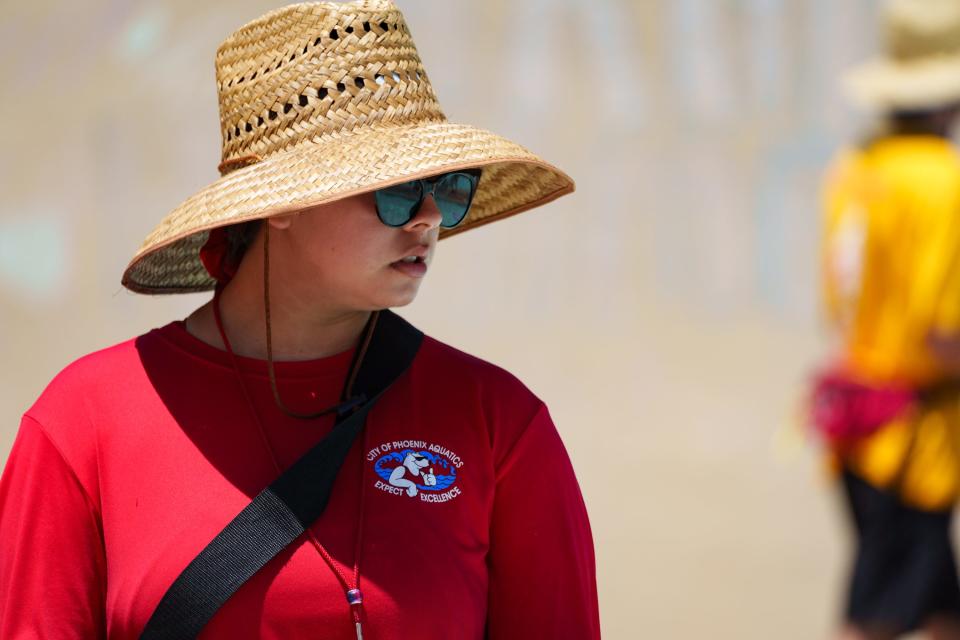Temperatures are climbing above 110. Why are so many Phoenix pools closed?
It was a typical oven-hot day in Phoenix. The temperature hovered at 100 degrees. The sun blazed white in a cloudless blue sky.
To keep cool, Kamora Masters stood in the shade with friends at Harmon Pool, which was crowded with children splashing and playing in the refreshing water.
Masters, 16, said she and her friends come to Harmon Pool in south central Phoenix almost every day in the summer to escape the searing Arizona heat and hang out with other kids.
"We've been coming here for years," Masters said.
But just as temperatures are forecast to climb above 110 degrees, Harmon Pool has closed, barely a month after it opened. Masters and her friends will have to find somewhere else to swim. But that won't be easy.
Eleven of 29 Phoenix pools will not open this summer. Plus, six pools will only be open for one month, instead of the usual 10 weeks, including Harmon, where nearly 50% of the neighborhood's population lives in poverty. So only 15 of 18 pools will be open at a time, half the usual number.
City officials blame a lack of pool managers stemming from an ongoing pandemic-related lifeguard shortage for the pool closings and limited pool openings.
Phoenix residents depend on city pools to cool off in the summer and battle cabin fever. Phoenix, with 1.6 million people, is the nation's fifth-largest city. Temperatures average in the 100s more than 100 days a year, and it is not uncommon for temperatures to climb above 115, making Phoenix the hottest large city in the U.S. What's more, the temperature sometimes does not even drop below 90 at night.

Admission to city pools is free for kids, $3 for adults, and $1 for seniors 55 and older, making city pools an affordable option to seek relief from the summer heat.
Some children arrive when the pool opens and stay until it closes, said Elizabeth Evans, the Harmon pool manager.
"It's a safe place to come and have fun and swim," Evans said.
But the pool closings and reduced openings leave fewer options for residents to escape the heat and limit opportunities for children to learn to swim. These changes will disproportionately affect poor and working-class families, many of them people of color, experts say.
Many people who visit city pools don't have backyard pools of their own or don't have the financial means to travel to San Diego or other destinations to flee the heat and enjoy lower temperatures, as many Arizona families do in the summer.
"This is a game changer for most of our kids," said Mike Scroggins, who had brought 19 children from the Muriel Smith Recreation Center to Harmon Pool one recent afternoon.
"They love it," Scroggins said. "It's the summertime in Arizona, and everybody likes to swim."
Black and Latino children are less likely to know how to swim than white children, and swimming proficiency is low for kids from low-income households. Not knowing how to swim puts children at greater risk of drowning. It also prevents teens from being qualified for lifeguard jobs, experts say.
"We have a lot of working-class families that don't have the luxury of being able to have a pool in their backyard, and our community pools are incredibly important for our children," said Phoenix City Councilmember Betty Guardado, who represents District 5, which covers neighborhoods in west and northwest Phoenix. Guardado said she fought to keep all the pools in her district open this summer.
Children "went through a lot during the pandemic," Guardado said. "And for them to be able to get out and go to the pool and be able to hang out with their friends and do something healthy, that's something that's incredibly important for our kids."
Many affected pools in high-poverty neighborhoods
The 18 Phoenix pools that will be open for at least part of the summer is an improvement from last year when only 14 of 29 pools opened. In 2021, 12 pools opened. In 2020, the year of the pandemic, all 29 pools remained closed.
Still, just 15 Phoenix pools opened Memorial Day weekend. Three of those, Harmon, Cielito and Perry, only opened for June.
Three other pools, Falcon, Pierce and University, will open July 3 but will only be open that month.
Just 12 pools — Coronado, Cortez, Deer Valley, El Prado, Encanto, Maryvale, Paradise Valley, Pecos, Roosevelt, Starlight, Sunnyslope and Washington — will be open the usual schedule from Memorial Day weekend and then daily except Fridays through July 30. That list includes seven pools that serve some of the most affluent neighborhoods in the city based on census tract data: Coronado in east-central Phoenix; Paradise Valley in northeast Phoenix; Pecos in Ahwatukee; Encanto in north-central Phoenix; Sunnyslope in north Phoenix; Washington in northwest Phoenix and El Prado near South Mountain.
Five of the six pools open for only one month are in high-poverty neighborhoods, according to census tract data: Harmon, Cielito in west Phoenix; Perry in east-central Phoenix; Falcon in west Phoenix and University in west-central Phoenix.
The 11 pools that will remain closed all summer include five pools in neighborhoods, according to census tract data, with high poverty rates: Alkire in west-central Phoenix; Marivue in west Phoenix; Grant in south-central Phoenix; Hermoso in southeast Phoenix and Holiday in west Phoenix. Eight of the 11 are in neighborhoods where at least half of the residents are people of color.

Eight pools — Cortez, Encanto, Maryvale, Paradise Valley, Pecos, Roosevelt, Sunnyslope and Pierce — will be open for an extended period on weekends through Labor Day weekend.
The city could not hire enough qualified pool managers to run all 29 pools, said Phoenix Parks and Recreation spokesperson Adam Waltz. The lack of qualified pool managers stems from a nationwide shortage of lifeguards caused by the pandemic, which caused pools to close for the entire summer of 2020. Qualified pool managers must have experience as lifeguards and then assistant pool managers, he said. So with fewer lifeguards in the pipeline, there were fewer qualified pool managers, Waltz said.
"Part of what we're seeing is the consequences from COVID. By not having the pools open during that time, we kind of lost the continuum of pool managers and lifeguards," said Phoenix City Councilmember Kesha Hodge Washington, whose district includes neighborhoods in south and east Phoenix.
"From a safety standpoint, if we don't have adequate lifeguards or pool managers, we can't open a pool in a safe manner," she said.
Phoenix offered thousands as incentive pay

To hire more pool staff this summer, the city offered a $3,000 incentive pay to lifeguards, assistant pool managers and pool managers who work at least 240 hours this summer, Waltz said. Lifeguards earn $15.72 an hour. The incentive bumps lifeguard pay up to about $23 per hour and up to about $30 for pool managers.
But the city still wasn't able to find enough pool managers with the required amount of lifeguarding and assistant pool manager experience to open all 29 pools, he said.
"Our lifeguard hiring has actually been fantastic, but one of the key positions that we need in order to open a facility really is the pool manager," Waltz said.
The decisions regarding which pools to close and which pools to open for a reduced number of days were based on location and past attendance, Waltz said.
The goal was "to make sure we have equitable pool access throughout the city," Waltz said.
After Harmon Pool closes, the city will provide transportation from the Harmon Recreation Center to University Pool about 1.5 miles away, Waltz said.
Black, Latino and low-income kids less likely to be solid swimmers
Equitable access to pools is not just about having a fun place for everyone to cool off in the blistering heat — it's also about water safety.
Children who have little or no swimming ability have more chance of drowning. Because swimming ability varies by race, ethnicity and income, some populations are at greater risk.
A 2017 USA Swimming Foundation report concluded that 64% of Black children and 45% of Latino children had little or no swimming ability, compared to 40% of white children. Native people also have higher drowning rates, according to the Centers for Disease Control and Prevention.
That same study concluded nearly 80% of children from families with household incomes less than $50,000 have no or little swimming ability and that children qualifying for free or reduced school lunch programs are 63% less likely to have good swimming ability.
"Swimming is absolutely a lifesaving skill," said Elaine Calip, a representative of USA Swimming Foundation, in an email. "It’s the only sport that can save your life."
"Part of the problem is drownings are not nationally understood. We want to see policies change so that every young child knows basic water safety skills so they could get to the edge of the pool if they fell in," Calip said.
China Meader signed up her daughter, Nylahni, 5, for swim lessons at Harmon Pool. She was standing on the pool deck, keeping an eye on Nylahni in the water.
Meader said she has a car. So driving Nylahni to another pool when Harmon closes on Thursday won't be a problem. But she feels bad for children who walk to the pool and now may have a hard time getting to another pool.
"I think it's really sad for the people who live near here — very sad," Meader said.
Daniel Gonzalez covers race, equity and opportunity. Reach the reporter at daniel.gonzalez@arizonarepublic.com or 602-444-8312. Follow him on Twitter @azdangonzalez.
This article originally appeared on Arizona Republic: Phoenix is hottest city in U.S. but 11 of 29 pools didn't open. Why?

